|
De Vlaamse dichter en schrijver Jan Van Droogenbroeck werd geboren te Sint-Amands op 17 januari 1835. Zie ook alle tags voor Jan van Droogenbroeck op dit blog.
Zaterdagavond
Bombam, bombam
De groote klokke luidt;
Bombam, bombam
Wie weet wat dit beduidt?
De week is uit, de week is uit
En morgen is het zondag!
Bombam, bombam,
Ons huis is opgetooid;
Bombam, bombam,
De vloer met zand bestrooid,
Het wit gordijntje versch geplooid:
Want morgen is het zondag!
Bombam, bombam,
De koster luidt zoo sterk;
Bombam, bombam,
Sa, jongens aan het werk!
De straat gereven tot een perk,
Want morgen is het zondag!
Bombam, bombam,
De schoenen zijn gepoetst,
Bombam, bombam,
Ei! deed men nog iet goeds,
Zoo men op morgen werken moest?
Want morgen is het zondag!
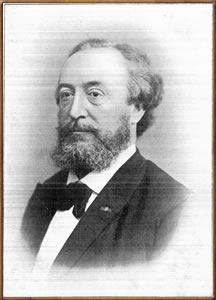
Jan Van Droogenbroeck (17 januari 1835 - 27 mei 1902)
De Surinaamse schrijfster en beeldend kunstenares Dorothee Wong Loi Sing werd geboren in Paramaribo op 17 januari 1954. Zie ook alle tags voor Dorothee Wong Loi Sing op dit blog.
Uit: Witmans hel
“1984, de hèl:
de pesterige nachtmerries die ik de witmensen zend - popidool Michael Smackstones die een witmeisje in romantische vervoering brengt, om haar dan tijdens herhaalde kritieke hoogtepunten cool de rug toe te keren of uit te lachen; jazzidool Eartha Smitt of Gina Turner of Sarah Jauvhan die een witman hemel of hel belooft in een realistische droom, maar de arme man daarna plagerig nèt altijd een paar stappen te vlug af is, en verhit en onbevredigd laat ontwaken; en als toppunt de Kool-Cool-Gang, opererend in enkele parallelwerelden: de wereldwijde, geheime organisatie van zwarten en kleurlingen en overige minderheden, waarvan gefluisterd wordt dat zij de witmensen op Vudu-achtige manier geestelijk in beweging brengen, soms zelfs kwellen. Hoe juist, hoe goed, hoe rechtvaardig is mijn wraak. Vanuit Haïti, Brazilië, Trinidad en Suriname hebben verschillende vormen van magische godsdiensten als Umbanda, Xango, Caboclo, Bruha en Wisi hun weg gevonden naar wraakzuchtige afstammelingen van gemartelde negerslaven. De gereïncarneerde zwarten van vroeger zijn intussen overal geïnfiltreerd, door niets laten zij merken dat zij over bijzondere psikrachten beschikken, want zij beïnvloeden de direkte omgeving en de maatschappij en hun parallelwereld liever op indirekte wijze, door middel van onder andere wilsoplegging, telepathische idee-opdringing of ‘voorspellende’ dromen.”

Dorothee Wong Loi Sing (Paramaribo, 17 januari 1954)
Tina Turner
De Duitse schrijfster Hella Eckert werd geboren op 17 januari 1948 in Bremen. Zie ook alle tags voor Hella Eckert op dit blog.
Uit:Hanomag
“Ich finde, es ist schwer genug, Dinge zu begreifen, die man nicht begreifen kann, und mit siebzehn, finde ich, ist man noch verdammt jung.«
Mein Vater sah zu, wie im Hof das Licht ausging. He, sagte er, deine Mutter wird denken, wir sind verlorengegangen. Wir sollten ihr sagen, wo wir sind. Dass wir bei Dora sind.
Ja, sagte ich. Und ich stellte mir vor, wie ich hochlief und meiner Mutter sagte, Wir sind unten bei Dora und trinken Wermut, und vielleicht sind wir morgen schon alle auf dem Weg nach Marseille.
Ich fahre nach Marseille, sagte mein Vater, Und wenn irgendwas bei dieser Reise schiefgeht, setze ich mich in den Hanomag und fahre mitten ins Büro von Monsieur Diadem. Ich meine, falls Monsieur Diadem ein Büro hat. Falls er nicht gerade mit einer Waffe vorm Spiegel steht und kämpft. Was sollte schiefgehen? fragte ich. Mein Vater antwortete nicht. Er sagte, Würdest du mitkommen?
Würdest du das wollen, herausfinden, was an der Sache mit Marseille dran ist? Nein, sagte ich. Ich würde das nicht wollen. Du bist wirklich klug, sagte mein Vater.
Du lässt dich in nichts hineinziehen. Du bist so klug, dass man denken könnte, du bist erwachsen und nicht ich.“
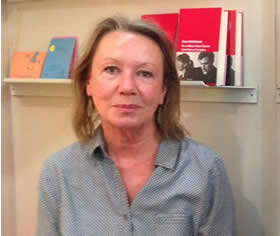
Hella Eckert (Bremen,17 januari 1948)
De Engelse schrijver Nevil Shute werd geboren op 17 januari 1899 in Ealing. Zie ook alle tags voor Nevil Shute op dit blog.
Uit: The Far Country
“He thought about it, trying to absorb this new idea, to visualize what it was that she wanted. "I thought you might like a bracelet, or a ring," he said. With so much money in their pockets, after so long, she should have something really good.
She squeezed his arm. "That's sweet of you, but I don't want jewelry. I'd never be anywhere where I could wear it. No, I want a picture."
He tried to measure her desire by yardstick. "Any idea what it'll cost?"
"I don't know till I see it," she said. "It might cost a hundred pounds."
"A hundred pounds!" he said. "My word!"
"Well, what's the Ford going to cost you?"
"Aw, look," he said. "That's different. That's for the station."
"No, it's not," she said. "The Chev'll do the station work for years to come. It's for you to run about in and cut a dash, and it's costing fourteen hundred pounds."
"It's for both of us," he said weakly, " and it comes off the tax."
"Not all of it," she said. "If you're having your Ford Custom I'm going to have my picture."
He realized that she was set on having this picture; it was a strange idea to him, but he acquiesced. "There's a shop down here somewhere," he said. "Maybe there'd be something there you like."
When they came to the shop it was closed, but the windows were full of pictures, religious and secular. He knew better than to offer her a picture of the infant Christ in her present mood, although he rather admired it himself. He said, "That's a nice one, that one of the harbour. The one where it says 'St. Ives."'
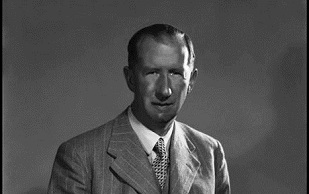
Nevil Shute (17 januari 1899 – 12 januari 1960)
De Engelse schrijfster Mrs Henry Wood werd geboren in Worcester op 17 januari 1814 als Ellen Price. Zie ook alle tags voor Mrs Henry Wood op dit blog.
Uit: East Lynne
“Up to his five and twentieth year, he had been industrious and steady, had kept his terms in the Temple, and studied late and early. The sober application of William Vane had been a by word with the embryo barristers around; Judge Vane, they ironically called him; and they strove ineffectually to allure him away to idleness and pleasure. But young Vane was ambitious, and he knew that on his own talents and exertions must depend his own rising in the world. He was of excellent family, but poor, counting a relative in the old Earl of Mount Severn. The possibility of his succeeding to the earldom never occurred to him, for three healthy lives, two of them young, stood between him and the title. Yet those have died off, one of apoplexy, one of fever, in Africa, the third boating at Oxford; and the young Temple student, William Vane, suddenly found himself Earl of Mount Severn, and the lawful possessor of sixty thousand a year.
His first idea was, that he should never be able to spend the money; that such a sum, year by year, could _not_ be spent. It was a wonder his head was not turned by adulation at the onset, for he was courted, flattered and caressed by all classes, from a royal duke downward. He became the most attractive man of his day, the lion in society; for independent of his newly-acquired wealth and title, he was of distinguished appearance and fascinating manners. But unfortunately, the prudence which had sustained William Vane, the poor law student, in his solitary Temple chambers entirely forsook William Vane, the young Earl of Mount Severn, and he commenced his career on a scale of speed so great, that all staid people said he was going to ruin and the deuce headlong.”
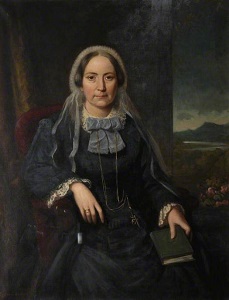
Mrs Henry Wood (17 januari 1814 – 10 februari 1887
Portret door Joseph Sydney Willis Hodges. 1875
De Engelse schrijver, politicus en staatsman George Lyttelton, 1e Baron Lyttelton werd geboren in Hagley, Worcestershire op 17 januari 1709. Zie ook alle tags voor George Lyttelton op dit blog.
Uit: Dialogues of the Dead
„Lord Falkland.—Nature, sir, will in the end be sure to set right whatever opinion contradicts her great laws, let who will be the teacher. But, indeed, the more I reflect on those miserable times in which we both lived, the more I esteem it a favour of Providence to us that we were cut off so soon. The most grievous misfortune that can befall a virtuous man is to be in such a state that he can hardly so act as to approve his own conduct. In such a state we both were. We could not easily make a step, either forward or backward, without great hazard of guilt, or at least of dishonour. We were unhappily entangled in connections with men who did not mean so well as ourselves, or did not judge so rightly. If we endeavoured to stop them, they thought us false to the cause; if we went on with them, we ran directly upon rocks, which we saw, but could not avoid. Nor could we take shelter in a philosophical retreat from business. Inaction would in us have been cowardice and desertion. To complete the public calamities, a religious fury, on both sides, mingled itself with the rage of our civil dissensions, more frantic than that, more implacable, more averse to all healing measures. The most intemperate counsels were thought the most pious, and a regard to the laws, if they opposed the suggestions of these fiery zealots, was accounted irreligion. This added new difficulties to what was before but too difficult in itself, the settling of a nation which no longer could put any confidence in its sovereign, nor lay more restraints on the royal authority without destroying the balance of the whole constitution. p. 12In those circumstances, the balls that pierced our hearts were directed thither by the hands of our guardian angels, to deliver us from horrors we could not support, and perhaps from a guilt our souls abhorred. »
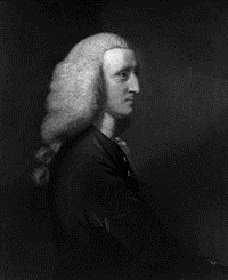
George Lyttelton (17 januari 1709 – 24 augustus 1773)
|



